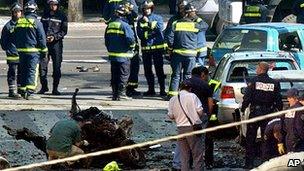Eta ceasefire scoop: how the BBC got the story
- Published
Eta announce ceasefire
I had not heard from him for about a year, then out of the blue I received an e-mail saying he had been trying to find me.
He was going to be in London the following week and perhaps we could meet up for coffee.
"Of course," I said. So we met outside Covent Garden tube station and headed for a small cafe nearby.
He had not changed much since I had last seen him - a little greyer, perhaps, but then so was I.
"I have something to tell you," he declared in hushed tones, as I stirred some sugar into my coffee.
"Eta is seriously considering calling a halt to its armed struggle for a Basque state. If you are interested, you can break the news to the world."
'No joke'
I was drinking my coffee by then and almost choked.
"Do you think you might be interested?"
It was an enormous scoop being handed to me on a plate.
"Are you kidding?" I said.
"No, this isn't a joke."
Basque nationalists, he told me, were now frustrated.
The chances of an independent Basque state being created were as remote now as they had ever been in the last 50 years.
The people of Catalonia had just managed to win more autonomy from Madrid, and separatists there had no army of bombers and gunmen.
Could it be, he said, that actually Eta had been hindering the cause of Basque nationalism, rather than helping it?
After all, the politicians in Madrid had a ready-made excuse for not allowing a referendum on independence.
That excuse was Eta violence. So what if that excuse was taken away?
Cloak and dagger
He was convinced his phone was being tapped, so I had to be careful when I wanted to contact him.
"We cannot talk to each other in the meantime," he told me. "But if Eta does decide on a ceasefire, it will record a prepared statement on videotape as it's done in the past.

More than 800 people have died in ETA violence in the past 40 years
"Obviously I can't confirm this to you over the phone, but if you receive a text message saying, 'It was good to see you in London,' then that is your cue to meet me in a few days' time in Paris outside the Gare du Nord at 2pm and I'll have the tape."
We finished our coffees and said goodbye.
I genuinely did not believe I would have to go to Paris, and pretty much forgot that afternoon meeting.
A few days later, I was visiting my mother in the Midlands and around lunchtime I received a text message.
It read: "It was good to see you in London." But it just didn't register in my brain.
I did not recognise the number. The message was cryptic; it didn't make sense.
It was only two hours later that the penny dropped: "Oh my God, I have to get to Paris!"
Anxious wait
I arrived slightly early at Gare du Nord.
I was nervous. Like a scene from a cheap spy novel, I kept looking around to see if anyone was watching me.
The minutes ticked by: 1400, 14.05, 14.10, 14.15p. He is late.
The worst thoughts then popped into my head. Maybe he has been caught with the tape and is in a police cell somewhere.
Maybe he has changed his mind about our rendezvous. Maybe he was winding me up all along. Maybe he is at another entrance to the station!
I walked round the corner and looked down the street. No sign of him.
I thought to myself: "I've come on a wild-goose chase."
I returned back to the main entrance, and there he was.
I got the tape, and as they say, the rest is history.